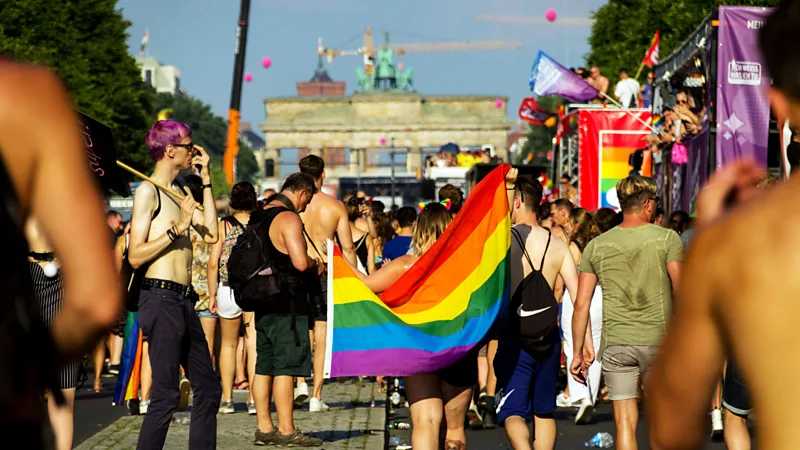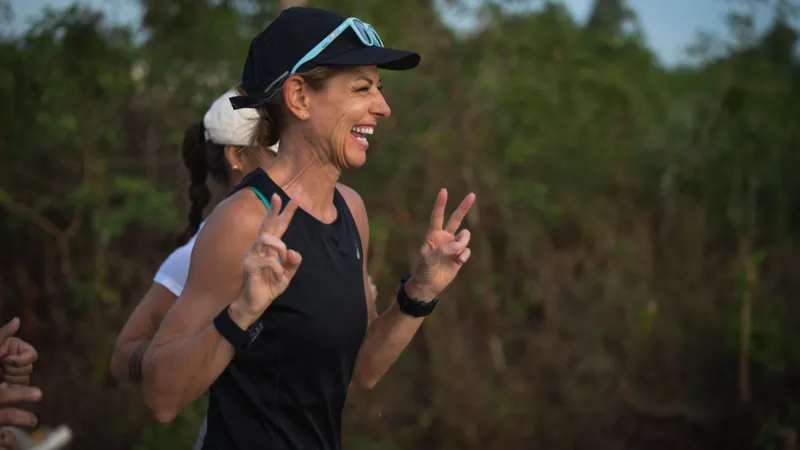Seven of the best LGBTQ+ spaces in Berlin
DJ Cormac left Northern Ireland and dominated Berlin's queer dance music scene. Here's his guide to Berlin's best LGBTQ+ spaces, from gay saunas to body art.

Famed for a relaxed, non-conformist atmosphere, Berlin has long attracted musicians and artists from all around the world, ready to immerse themselves in the German capital's creative vibe.
Berlin also prides itself on its carefree live-and-let-live attitude and has historically been celebrated as one of the best places for LGBTQ+ communities to thrive.
We spoke to DJ Cormac, a well-known DJ in Berlin's LGBTQ+ nightclub scene for more than 20 years, to get to the heart of queer Berlin. "As far back as the 1920s and 1930s [Berlin] was known for a lot of very gender-fluid and queer culture," says Cormac, whose podcast, Queerly Beloved, opens up conversations around music, queerness and anything that may shape queer stories. "And it’s always had this quite permissive, somewhat hedonistic, alternative culture about it."
Born in Northern Ireland, DJ Cormac moved to London in the early noughties and cut his teeth in house and techno, becoming a fixture at iconic clubs like Trade, Bugged Out and Nag, Nag, Nag before hitting the dancefloors of Berlin. The renowned DJ plays crowd-pleasing sets of highly curated Hi-NRG, Italo house and techno at Berlin's most famous venues. He is the owner of Polari Records.
The largest city in Germany, Berlin continues to have an exciting LGBTQ+ scene with a plethora of queer clubs, bars, restaurants and shops lining its leafy streets and graffiti-tagged buildings. "I think at the moment, within Europe, it's one of the places a lot of queer people come to because there's a lot of awareness around queer spaces and queer issues, and I think a lot of people end up here because they feel safer," says Cormac.
Hailing from Northern Ireland, Cormac was first drawn to Berlin because of its iconic dance music scene. But Cormac says that while partying is a big part of the Berlin lifestyle, the city's queer scene transcends its well-trodden, heady dancefloors, yielding to quieter spaces, tucked away from the strobe lights, where he's found his place among other members of the LGBTQ+ community.
Here are DJ Cormac's seven favourite queer spaces in Berlin.
1. Best for body art: AKA Berlin
Cormac's first stop is an art gallery with a tattoo and piercing studio: AKA Berlin. "People fly in from all over the world to be tattooed there," says Cormac. "It's queer-owned and also has quite a lot of queer artists working there."
AKA Berlin was founded in 2009 by performance and body artist Jon John and musician Valentin Plessy, hoping to create a vibe where anyone could feel safe and included while exploring tattooing and art – all in the same place.
"I would go there often for an exhibition and to hang out," says Cormac. "They have lovely exhibitions and it's just a lovely community of people to be around; queer artists who are doing well and are very humble. There’s a lot of talent there."
This unique, hybrid space and friendly atmosphere has attracted some of the most prominent names in modern tattooing, with a shared purpose to make body art progressive and open to all.
"They give opportunities to travelling artists," says Cormac. "So if there's a tattoo artist coming to Berlin for example, they might do a residency at AKA for a bit."
2. Best for ambient music and chilled vibes: Kwia Berlin
The queer-friendly district of Kreuzberg is one of Cormac’s favourite areas in Berlin, where he goes to "escape the bustle".
Adjacent to Checkpoint Charlie, the most famous crossing point of the Berlin Wall, Kreuzberg was historically one of the poorest areas of the city. But since the wall came down, this now-trendy, artsy and vibrant neighbourhood has become home to a large immigrant population and offers an eclectic choice of bars and eateries studded along the picturesque Landwehr Canal. Namely Kwia, a queer, ambient bar and cafe/gallery that's Cormac’s top choice for drinks and chill music in a cosy, mellow atmosphere.
Cormac's tip for anyone planning to come to Berlin to celebrate Pride is to go during Christopher Street Day, an annual festival held in the second half of July (27 July this year).
"It is the big pride weekend with street parties, marches and lots of clubs and outdoor events all over Berlin," he says.
Expect a party atmosphere with colourful parades and political speeches fighting for the rights of LGBTQ+ people.
"[I like to] drop in for juices or a drink," says Cormac. "But they also have a wide variety of art and music events with artists across different genres."
The space, inspired by the Japanese listening culture of 'jazz kissa' where jazz music is played for listening rather than background noise, is decked with trippy lighting and decorated with carpeted floors and large comfy cushions, giving it a house party vibe. This unique space is Cormac's perfect escape from the hedonism of the city’s nightclubs.
3. Best for shopping: Keller Kreuzberg
Also in Kreuzberg is Cormac's favourite shopping experience: Keller Kreuzberg. This queer focused store features work from LGBTQ+ designers and allies from across the world, including Berlin artist Andy Warlord; UK jewellery designer Hoemo World; American clean cosmetics company Noto; Australian fashion brand Project Claude and Klub Venus, a Danish sexual wellness brand.
Split over two floors, the shop sells "everything", says Cormac, "from books to clothes, to funny slogan baseball caps and sex toys". Upstairs is an explosion of fun queer gifts, whilst the basement is a treasure trove of hedonism; offering jewellery, sexual wellness toys and art prints.
"You'll buy stuff that you just won’t find anywhere else. And it's funny!" he says. For instance, they design their own T-shirts, socks and caps embellished with their logo: "Once a slur, now reclaimed by the LGBTQIA+ community."
Although Cormac says it is a fun shop to visit, there's also a deeper purpose behind the humour. "It's very sex-positive," he explains, "so they've tried to promote this message, because a lot of queer people grow up with an idea of shame around their sexuality – they really want to portray things in a much healthier, balanced way."
4. Best for relaxing: BOILER Sauna Berlin
With its Finnish sauna, whirlpool and private cabins, BOILER – a queer, contemporary three-storey bathhouse just outside U-Bahn (metro) station Mehringdamm – offers a retreat from Berlin's hustle.
"[It's] probably one of the nicest gay bathhouses in Europe," says Cormac.
Gay saunas have been an important part of LGBTQ+ culture for decades. Their heyday was in the 1970s, and many European cities still have luxury bathhouses as safe spaces for gay men to meet up.
BOILER remains popular in Berlin's queer community. "It's very busy on some weekends, and during Pride month it becomes very popular," Cormac says. "People might have to queue for a bit to get in, kind of like queuing to get into a club."
Sleek and modern, BOILER is constructed with shiny steel materials and neon lights, giving an industrial and futuristic feel.
"It's very beautiful," says Cormac. "It's known for its design and is a very nice place to visit… people go there to meet or hook up, but they also go there to relax."
After sweating it out in the sauna and steam room or taking a cold plunge, visit BOILER's garden with its bar serving small dishes such as pizza and filled baguettes as well as beer, wine and coffee.
5. Best for wellness: we.are.village
Cormac's next pick is we.are.village; a queer space where people can take part in all kinds of wellness activities, like queer yoga and queer needlework classes.
"We.are.village is basically a community centre space for men and people who identify as men, and it's really a space where they can gather and create and do workshops on things like queer loneliness," says Cormac.
A recent survey carried out by the Campaign to End Loneliness found that LGBTQ+ people are more likely to feel lonely than their heterosexual peers. Located in the heart of Schöneberg, historically regarded as Berlin's LGBTQ+ centre since the 1920s, the centre is a sanctuary for Cormac when he's not working the dance floors, and for anyone looking for deeper connections. "In Berlin there's a lot of focus on parties and there's a lot of focus on clubs, and that’s great," he says. "But there are also people who don't want to do that and it gives a platform and space to people who might want to meet outside of a club space, which I think is really cool."
Cormac recommends checking out we.are.village because: "It's very easy to go out and find a queer club. But it's not so easy to go out and find somewhere men can sit and discuss loneliness."
6. Best for coffee and pastry: C + bakery
No trip to Berlin would be complete without partaking in its seductive cafe culture. Cormac recommends shunning the chain stores and going off the beaten track to this hidden nook in Kreuzberg.
C+ bakery is a queer-owned cafe selling all types of homemade goods including cupcakes, brownies and some quirky variations on German classics like Black Forest buns.
They also run regular workshops and events such as pancake-making classes, queer comedy nights and karaoke, when locals and tourists cram into this tiny space and you can hear the laughter out on the street.
"They specialise in cinnamon rolls and they're really delicious," says Cormac. "Everything's vegan and they also have some gluten-free options. And they have a noticeboard with things going on in the city."
Cormac jokes that it’s not very rock'n'roll to recommend a bakery, but he loves the vibe of the place and that's where he goes for his coffee fix and sugar hit. He says: "It's nice to go and sit in a cafe where you don’t have to be at all vigilant about how you appear or what you look like. I like that little cafe, it's really cute."
7. Best for queer culture and history: Café Morgenrot
Café Morgenrot blends coffee with a healthy serving of Berlin's queer history. Found in the trendy Prenzlauer Berg neighbourhood, this collective-run cafe is a meeting spot for left-wing activists and happens to neighbour Tuntenhaus – one of Berlin's last remaining queer squats.
Berlin's squat culture dates to the 1970s when young activists occupied empty buildings to save them from demolition and protest against housing problems and gentrification. And despite Berlin being one of Europe's most LGBTQ+-friendly cities, Cormac explains, "Queer culture in Berlin has a long history of squat culture, of people trying to live outside of the capitalist model… I think that becomes very relevant because a lot of queer people maybe haven't felt so embraced by mainstream capitalism, or the job opportunities in the past maybe haven’t been as available to them."
Many of Berlin's squats have been shut down by authorities, and the future of Tuntenhaus was at risk of a similar fate, but after a successful campaign, the squat remains home to one of the last queer collective housing communities in Berlin.
Cormac adds that it’s important "to be mindful that people live there and to respect people's privacy", so visitors can drop by Café Morgenrot for information about squat communities. The cafe is also known for its unpretentious vibe, as well the lavish vegan breakfast.
-bbc







